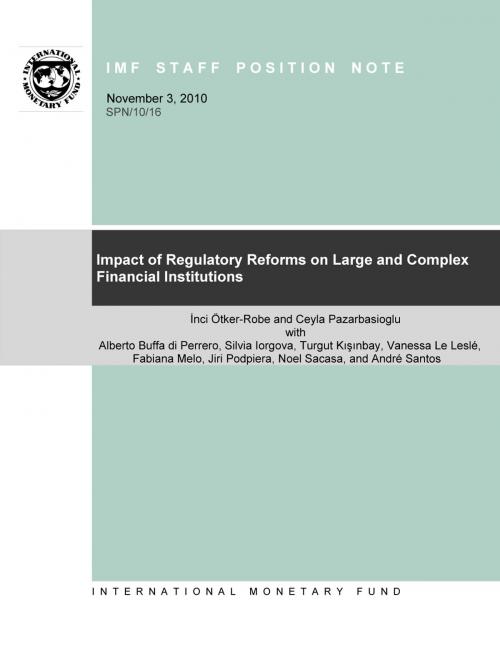Impact of Regulatory Reforms on Large and Complex Financial Institutions
Business & Finance, Economics, Money & Monetary Policy, Macroeconomics| Author: | Inci Ms. Ötker, Ceyla Pazarbasioglu | ISBN: | 9781455222971 |
| Publisher: | INTERNATIONAL MONETARY FUND | Publication: | November 3, 2010 |
| Imprint: | INTERNATIONAL MONETARY FUND | Language: | English |
| Author: | Inci Ms. Ötker, Ceyla Pazarbasioglu |
| ISBN: | 9781455222971 |
| Publisher: | INTERNATIONAL MONETARY FUND |
| Publication: | November 3, 2010 |
| Imprint: | INTERNATIONAL MONETARY FUND |
| Language: | English |
Financial sector reforms are being considered to address the risks posed by large and complex financial institutions (LCFIs). The vast majority of global finance is intermediated by a handful of these institutions with growing interconnections within and across borders. Common trends that contributed to the recent global crisis included sharp increases in leverage, significant reliance on short-term wholesale funding, growth of off-balance-sheet activities, maturity mismatches, and increased share of revenues from complex products and trading activities. The key objective of the financial sector reforms is to promote a less leveraged, less risky (or better cushioned), and thus a more resilient financial system that supports strong and sustainable economic growth. The recent proposals of the Basel Committee on Banking Supervision (BCBS) on capital standards represent a substantial improvement in the quantity and quality of capital in comparison with the pre-crisis situation. The analysis of this paper suggests that, subject to usual caveats associated with limited data disclosures and availability, phase-in arrangements will allow most banks to move to these higher standards through earnings retention, assuming a modest economic and earnings outlook. It also suggests that should banks generate strong earnings in the coming years, and distribute lower dividends, they could rebuild common equity capital ratios faster than required under the current phase-in periods. The analysis of the paper also suggests that the new capital standards will have a significant impact on investment-banking-type activities, including through tighter requirements for trading book exposures. Investment banking activities will also be affected by a host of other regulatory initiatives, including the new accounting rules and higher standards for securitization, derivatives, and trading businesses, as well as measures to restrain certain activities. Yet, LCFIs with an investment banking focus have flexible business models and can adjust their strategies easily to mitigate the effects of the regulatory reforms, notwithstanding a multitude of regulations affecting their activities. The ultimate effect of the reforms on business models remains to be seen until the regulations take their final shape.
Financial sector reforms are being considered to address the risks posed by large and complex financial institutions (LCFIs). The vast majority of global finance is intermediated by a handful of these institutions with growing interconnections within and across borders. Common trends that contributed to the recent global crisis included sharp increases in leverage, significant reliance on short-term wholesale funding, growth of off-balance-sheet activities, maturity mismatches, and increased share of revenues from complex products and trading activities. The key objective of the financial sector reforms is to promote a less leveraged, less risky (or better cushioned), and thus a more resilient financial system that supports strong and sustainable economic growth. The recent proposals of the Basel Committee on Banking Supervision (BCBS) on capital standards represent a substantial improvement in the quantity and quality of capital in comparison with the pre-crisis situation. The analysis of this paper suggests that, subject to usual caveats associated with limited data disclosures and availability, phase-in arrangements will allow most banks to move to these higher standards through earnings retention, assuming a modest economic and earnings outlook. It also suggests that should banks generate strong earnings in the coming years, and distribute lower dividends, they could rebuild common equity capital ratios faster than required under the current phase-in periods. The analysis of the paper also suggests that the new capital standards will have a significant impact on investment-banking-type activities, including through tighter requirements for trading book exposures. Investment banking activities will also be affected by a host of other regulatory initiatives, including the new accounting rules and higher standards for securitization, derivatives, and trading businesses, as well as measures to restrain certain activities. Yet, LCFIs with an investment banking focus have flexible business models and can adjust their strategies easily to mitigate the effects of the regulatory reforms, notwithstanding a multitude of regulations affecting their activities. The ultimate effect of the reforms on business models remains to be seen until the regulations take their final shape.















